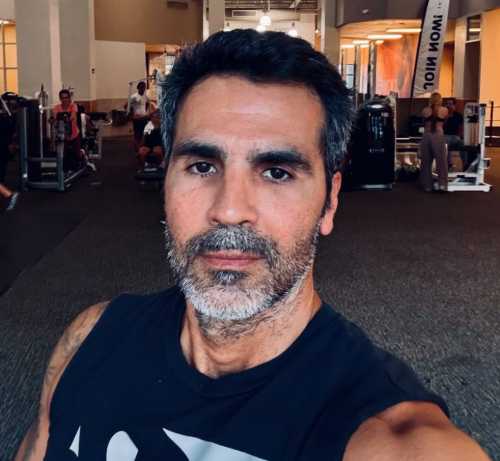
“Air” is a meaningful movie but an unsatisfying one. It’s a fascinating story vigorously depicted and acted, featuring characters whose heroism is unusual and whose place in history is both secure and obscure. The movie, directed by Ben Affleck, who also co-stars, depicts how Nike recruited Michael Jordan to the company, creating the Air Jordan line and thereby making the company very profitable and Jordan very rich. It’s a story of cultural change, of the invention of a ubiquitous style and its wider implications. Yet the film is a hermetic one, self-contained and nearly context-free, that thrusts its protagonists so far into the foreground that they block the movie’s purview. Rather than magnifying these characters, the close view diminishes them, elides their accomplishments from society at large, and renders them a mere success story.
The film delivers its own backstory. (It differs, of course, from some accounts of how Jordan came to join Nike.) In 1984, Nike is mired in third place behind the two industry leaders, Converse and Adidas. Sonny Vaccaro (Matt Damon), a basketball guru and a major promoter in the high-school and college game, is employed by Nike to provide contacts in the basketball world. The company is seeking endorsements from incoming rookies chosen in that year’s N.B.A. draft, and has committed two hundred and fifty thousand dollars to be spread among multiple players. But Sonny is fixated on the idea of putting all the eggs in one basket, concentrating the entire sum on one incoming player: Michael Jordan, taken third in the draft, by the Chicago Bulls.
Sonny’s plan poses a large risk to the company; his colleagues, other executives, and the company’s C.E.O., Phil Knight (Affleck), are leery of the plan. Moreover, Jordan’s agent, David Falk (Chris Messina), is guiding the athlete toward either of Nike’s two bigger and richer competitors. So, aided by wise counsel from two Black men—Howard White (Chris Tucker), the only Black executive at Nike who figures in the film, and George Raveling (Marlon Wayans), a prominent college-basketball coach who’s also Sonny’s longtime friend—Sonny makes an end run around both David and Phil and takes his pitch for Nike directly to the de-facto boss of Jordan’s business concerns: the athlete’s mother, Deloris (Viola Davis), at the family home, in Wilmington, North Carolina. (Michael, played by Damian Young, appears only as a background character.)
The question of why in the world this quest is of any dramatic significance is rooted in the three prime lines of drama that the movie’s script, by Alex Convery, boldly sketches: Sonny’s quest, Deloris’s quest, and Phil’s quest. The movie rushes by agreeably because its story is constructed three-dimensionally; every action, every moment, is plotted simultaneously on three lines of effort, which don’t all cohere into a single shape until the happy ending.
Sonny sparks the action as the only sports marketer who recognizes Jordan as not just a very talented player but a great one, because of the combined superiority of Jordan’s athletic ability and unique sense of will, determination, even destiny. Affleck cannily, even cagily, reveals the insight on which Sonny’s judgment is based, in a scene that’s among the movie’s most enticing. Sonny watches, over and over, a videotape of Jordan’s signature moment in college ball—a championship-winning shot that he hit in 1982. Shortly thereafter, Sonny forces Rob Strasser (Jason Bateman), an executive who runs marketing, to watch the same snippet of tape. Sonny explains that he sees hidden in it, in plain sight, Jordan’s awareness that he’ll be getting the ball on a planned play, his relaxed confidence in taking a shot that’s critical to his own career, his coach’s career, and the team’s fortunes. It’s the quality that Sonny defines as greatness, and he can detect it both as a student of the game and an insightful psychologist (like a filmmaker who perceives the transcendent star quality of an untested actor). That intuition is what drives Sonny’s all-out effort to recruit Jordan for Nike.
When Deloris is convinced that Nike is the right choice, she adds a contractual stipulation that is both an inspiration and a grand, even historic, declaration of principle: that, in addition to his fee, her son be paid a percentage of every sale of an Air Jordan shoe, anywhere in the world. The principle, of course, is that the athlete is no mere adornment for the brand but, rather, the prime source of the shoe’s value, not an amplification to the business but the crucial participant in it. The moral essence of her insistence is that the athlete is entitled to a part of the wealth that they create—and the political implication, unvoiced but resonant, is that Black athletes should have a share of the vast wealth that they’re creating for white-run businesses.
Affleck, both as an actor and a director, emphasizes Phil’s idiosyncratic temperament and his co-creation of Nike as a reflection of his personality. (This approach is reflected in the deployment of the company’s aphoristic statement of principles, which are quoted onscreen and illustrated in dramatic scenes.) Yet, after the company went public in 1980, Phil is beholden to a board of directors, who, with an eye on the bottom line, scrutinize his decisions and could even fire him. Sonny asserts that the spirit of the company is at risk of being lost if Phil loses confidence in his own judgment (which is to say, in Sonny) and yields to corporate routine, boardroom prudence, and business-school calculations. Consider Sonny a filmmaker and Phil a producer.
That analogy, far from being merely a hint of Affleck and Damon’s personal investment in the story of “Air,” is at the core of Affleck’s direction. The drama is something like a parody and a perversion of auteurism—a top-down and mastermind-centric view of the recruitment of Jordan, one that takes little interest in the wide range of activities involved in the project and in the development of the shoe, little interest in who’ll be buying the shoe and what it will mean to the buyer. Howard underscores the market importance of basketball shoes because of the racial gap in the running-shoe market, joking that Black people are unlikely to go jogging for fear of being mistaken for fleeing suspects. It’s a line of dialogue that does a huge amount of work, in lieu of drama.
“Air” is a story of fashion, of music, of sports and athleticism themselves as a kind of style and even of artistic expression; of the sudden ubiquity of popular musicians by way of music videos and MTV; of the relationship of American racial politics to style; and of the rapid and definitive emergence of hip-hop as the prime national and international music. The shoes are being marketed foremost to young Black consumers, yet the prospective buyers are never heard from, hardly even seen. The only young Black character in the film (other than Michael Jordan) is a clerk (Asanté Deshon) at a 7-Eleven, a basketball fan who opines to Sonny that Jordan is “too small for the N.B.A.” (Later in the film, after Jordan has become a star, he tells Sonny, “We all knew.”) The point is, doubtless unintentionally, a sordid one: that, in the street, the prevailing wisdom holds sway, but, to lead public opinion, to create a phenomenon, it takes the leadership of an expert—someone like Sonny.
The process that “Air” details is nonetheless absorbing. Sonny’s acumen extends beyond the basketball court into the business side, as when, at his first meeting with Deloris, he’s both unusually candid and insightful about the disadvantages that a contract with Converse or Adidas would pose to Michael. (Her confidence in Sonny’s judgment is reinforced when his predictions about the course of the Jordans’ meetings with those companies’ executives prove correct.) Sonny stage-manages the actual business of persuasion—the pitch that Nike will formally make to the Jordans, Deloris and James (Julius Tennon, Davis’s real-life husband)—and it involves a twist of clumsiness that’s amusing, and a burst of inspiration that’s thrilling. (I won’t spoil the backstory, which involves a lesson that George, as a long-ago witness to a historic event, imparts to Sonny.)
“Air” is a dialogue-rich film, as befits a movie about negotiations, and the dialogue is delivered with flair and enthusiasm, not least because its actors contributed greatly to crafting it. The script is the first by Convery to be produced, and he reports (in a fascinating interview by Kate Erbland) that Affleck and the cast—mainly Damon, Tucker, and Davis—subjected the screenplay to a high level of revision. Tucker wrote most of his own dialogue, and Davis wrote the most important part of hers. (Don’t trust the credits: in general, directors and actors with significant artistry and clout are surely doing a significant amount of writing.) Damon is both commanding and miscast, both conspicuously gleeful in the role of Sonny yet all too breezy and lacking spice and rough edges; it’s Davis who, in a relatively little amount of screen time, gives the film its anchoring performance.
However, the movie’s florid talk doesn’t only serve the drama or provide the sheer pleasure of the back-and-forth. The talk fills the movie like dramatic spacing and padding, delivering moods—man-to-man ballbusting, sentimental bonding, earnest confessions—as a way of marking time and building suspense without actually conveying much about characters, their experiences and their thoughts, or yielding the screen to characters or situations who aren’t at the center of the story and the top of the pyramid.
The most crucial of those additional presences is Peter Moore (Matthew Maher), the shoemaker. He’s at once a scientist and an artist, an engineer and a fashion designer, who cocoons himself in his underlit, laboratory-like studio. Inspired by Arthur Ashe’s line of tennis racquets, Sonny wants Peter to make a shoe to Jordan’s own specifications; as I watched the movie, I was intensely curious about what this notion would mean in practice. But the movie spends very little time in the laboratory or with Peter. When Sonny goes to see what Peter has come up with, the engineer proudly declares that he has achieved something new: “It is the logic of water.” It’s a nice line, but what does he mean? It’s negatively exemplary of the film that its crucially physical aspect—the one where the foot goes into the shoe, where the rubber hits the road—is elided in favor of a one-liner and a conceptual hand wave.
Lack of physicality is perhaps the defining trait of Affleck’s direction, both here and in his Oscar-winning “Argo.” (Both films were the result of a script from the Black List, the Hollywood honor roll of notable unproduced screenplays.) What Affleck creates, as a director, is fishbowl cinema, observing his characters’ action without any seeming point of contact with the actors, without any sense of presence, through walls of glass thicker and more airtight than those of his camera’s lenses. His sense of story is so specific that he displays it whole and closed off, without any apparent curiosity about what goes into it and what arises from it; his conception of characters is so closely tied to dramatic necessity that he neglects to consider them as people. The movie’s substance remains largely implicit; its pleasures are partial, detached, and superficial. It offers little context, background, personality, or anything that risks distracting from the show. ♦
Sourse: newyorker.com






